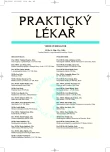Serum tumour markers in the era of development of molecular biology techniques in oncology
Authors:
M. Šimičková 1; M. Nekulová 1; L. Pecen 3; T. Frgala 2; D. Valík 1
Authors‘ workplace:
Masarykův onkologický ústav, Brno
Ředitel: Prof. MUDr. Rostislav Vyzula, CSc.
Oddělení laboratorní medicíny
Primář: MUDr. Dalibor Valík Ph. D.
1; Masarykův onkologický ústav, Brno
Ředitel: Prof. MUDr. Rostislav Vyzula, CSc.
Oddělení gynekologie
Primář: MUDr. Miloš Bláha
2; Ústav informatiky AV ČR, Praha
Vedoucí: doc. Ing. E. Pelikán, CSc.
3
Published in:
Prakt. Lék. 2007; 87(5): 294-298
Category:
Diagnostis
Overview
This article summarizes the current understanding about classical serum tumour markers and the possibility of their use in oncological practice at a time of intensive development in molecular biology techniques. These new procedures, based at the molecular level, have yet to replace serum tumour markers in clinical practice. The importance of serum markers mainly lies in monitoring disease recurrence and following the effectiveness of therapy, as outlined (and regularly updated) in international scientific publications. Fully automatic determinations of serum tumour markers are non-invasive, economically efficient procedures, which enable the dynamics of their changes during malignant disease to be monitored and thus contribute to the rationalization of oncological therapy.
Key words:
serum tumour markers, guidelines, follow-up of disease progression, prediction of therapy effectiveness.
Labels
General practitioner for children and adolescents General practitioner for adultsArticle was published in
General Practitioner

2007 Issue 5
Most read in this issue
- Differential diagnostic of leucopenias
- Skin and alcohol
- Somatisation in childhood and adolescence
- Acute renal failure
